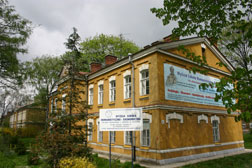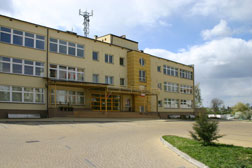INTERNATIONAL COOPERATION
We put a special emphasis on the developing and maintaining international cooperation. Our partnership offer is addressed both to the European Union Countries and also other countries.
At the moment the most important part of our international activity is the Lifelong Learning: Erasmus Programme funded by the EU. We have signed a bilateral cooperation agreement with Universities in Europe and the USA. Our students study abroad within the confines of the Students Mobility grant. Apart from that our teachers conduct lectures in foreign institutions as the part of the Teachers Mobility programme. We have also introduced the ECTS system in our college and we are ready to host foreign students in Zamość.






Within the confines of the international co-operation our college also holds serial conferences and seminaries with the participation of the foreign visitors.
Our partners:
| Lp. | Nazwa uczelni | Kraj | Kod erasmusa | Link |
|---|---|---|---|---|
| 1 | VIVES University College Kortrijk-Roeselare-Tielt-Torhout | Belgia | B KORTRIJ01 | https://www.vives.be/ |
| 2 | Vysoká škola evropských a regionálních studií, o.p.s. | Czechy - České Budějovice | CZ CESKE03 | http://vsers.cz/ |
| 3 | UNIVERSIDADE DE EIRA INTERIOR; Faculty of Human and Social Sciences | Portugalia - Covilha | P COVILHA01 | https://www.ubi.pt/ |
| 4 | INSTITUTO SUPERIOR DE COMUNICAÇAO EMPRESARIAL | Portugalia- Lizbona | P LISBOA58 | http://www.iscem.pt/ |
| 5 | POLYTECHNIC INSTITUTE OF BRAGANCA | Portugalia-Braganca | P BRAGANC01 | http://portal3.ipb.pt/index.php/pt/ipb |
| 6 | POLYTECHNIC INSTITUTE OF SANTAREM, School of Management and Technology | Portugalia- Santarem | P SANTARE01 | http://si.esgt.ipsantarem.pt/esgt_si/web_page.inicial |
| 7 | POLYTECHNIC INSTITUTE OF GUARDA | Portugalia- Guarda | P GUARDA01 | http://portal.ipg.pt/webapps/portal/frameset.jsp |
| 8 | UNIVERSITATEA DIN ORADEA | Rumunia-Oradea | RO ORADEA01 | http://www.uoradea.ro/ |
| 9 | SCHOOL OF BUSINESS AND MANAGEMENT | Słowenia - Novo Mesto | SI NOVO-ME01 | http://www.vs-nm.si/ |
| 10 | FACULTY OF COMMERCIAL AND BUSINESS SCIENCES | Słowenia - Celje | SI CELJE04 | http://www.fkpv.si |
| 11 | ERCIYES UNIVERSITY | Turcja - Kayseri | TR KAYSERY01 | http://en.erciyes.edu.tr/ |
| 12 | BANKING INSTITUTE COLLEGE OF BANKING | Czechy - Praha | CZ PRAHA11 | http://bivs.czy/ |
| 13 | ACADEMIA MILITAR | Portugalia- Lizbona | P LISBOA108 | http://academiamilitar.pt/ |
| 14 | UNIVERSITY OF NATIONAL AND WORLD ECONOMY | Bułgaria - Sofia | BG SOFIA03 | http://www.unwe.bg/en/ |
| 15 | THE D.A. TSENOV ACADEMY OF ECONOMICS | Bułgaria - Svishtov | BG SVISHTO02 | http://www.uni-svishtov.bg/default.asp?ver=EN |
| 16 | GRADUATE SCHOOL OF GOVERNMENT IN EUROPEAN STUDIES | Słowenia- Krajn | SI KRANJ03 | www.fds.si |
| 17 | EUROPEAN FACULTY OF LAW | Słowenia - | SI NOVA GO04 | http://www.evro-pf.si/en/ |
| 18 | GEA COLLEGE - FACULTY OF ENTREPRENEURSHIP (GEA COLLEGE -Fakulteta za podjetništvo) | Słowenia - Ljubljana | SI PORTORO02 | http://gea-college.si/ |
| 19 | USAK UNIVERSITY | Turcja- Usak | TR USAK01 | http://www.usak.edu.tr/ |
Erasmus Policy Statement:
In 2014 - 2020 the Jan Zamoyski College of
Humanities and Economics will continue cooperation with its current
partners within student and teacher mobility programmes as well as will
start new partnerships with foreign higher education institutions.
The conclusions drawn by the participants and their observations as
well as talks with the representatives of foreign universities carried
out during preparatory visits will influence shaping the school's work
and will help it in its activities aimed at adjusting it to functioning
in changing economic conditions.
An important objective in the coming period is increasing the number of
outgoing students and involving students of all faculties in the
mobility activities.
Another priority is attracting incoming foreign students; to achieve
this the school intends to address its offer at higher education
institutions from the newly accepted member countries of the European
Union.
The school will disseminate information concerning the Erasmus Charter
and the EPS in the printed form ( posters, leaflets, brochures) and in
the form of electronic publications. Besides, students will receive
infromation on the matter during meetings with the school staff members
responsible for foreign cooperation.
The school is opposed out of definition to any forms of discrimination
and is open to all candidates irrespective of their race, sex or
religion.
Students who suffer from motor disability have their classes planned in
places which can be accessed thanks to wheelchair ramps and lifts.
Those economically disadvantaged receive support in the form of
scholarships and favourable arrangements concerning payment of tuition
fee.
We have aquired high standards in the quality of
student and staff mobility through a careful selection of candidates
and their proper preparation for the programme. A vital factor in the
selection process are the opinions of those teachers who work with
particular candidates concerning their academic achievements,
interpersonal qualities and foreign language communication skills.
Information on the principles and activities involved in the
participation in Erasmus programmes is disseminated through posters,
leaflests and publications on the school's website. Besides the staff
members responsible for the programme pass information to candidates
during numerous direct meetings.
The suitability and proper construction of the study cycles undertaken
by our students is under constant supervision from the school thanks to
the introduction of the ECTS system.
Learning agreements are created after an analysis of the host
university educational offer, its confrontation with our school's study
curriculum ( concerning the character of subjects taught and the ECTS )
and consultations with all the teachers who would be teaching
particular candidates during their mobility period. Thus the outgoing
students are fully aware of the requirements they face in order to
achieve recognition of the foreign study course. The school offers
similar opportunities to potential incoming students, however so far we
have not hosted any students from other countries.
Participation of staff members in foreign mobility programmes is
considered as a factor constructing the school's academic standards and
as and indicator of the staff individual achievements.
The school enters partnerships only with those institutions whose academic standards and attitude to international cooperation guarantee a positive result of partner contacts. Signing and implementation of a bilateral agreement are preceded by intense correspondence and preparatory visits of representatives of partner universities. The final decision on implementation of bilateral agreement is based on a detailed analysis of academic and cultural benefits the candidates may aquire thanks to studying at a foreign university. Selection of mobility dates is done in consultation with both the hosting university and the candidates themselves. The study period spent at a foreign university, equal in length to one term, is treated in the same way as a study period at our school.

